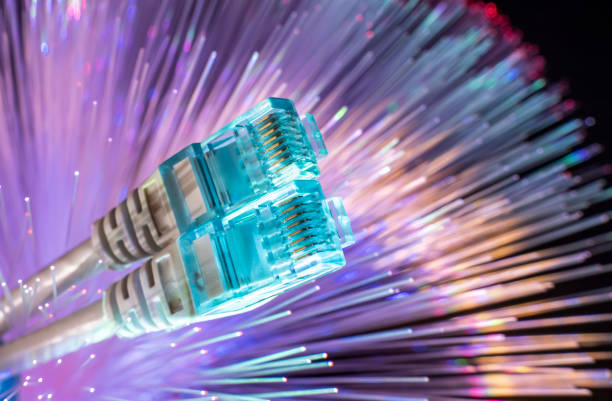Choosing the Perfect Fiber Internet Provider
In today’s digitally driven world, a reliable and high-speed internet connection is a must-have for both personal and professional needs. Out of so many options available, fiber internet has come up as the top choice for its unmatched speed and stability. However, with a lot of fiber internet providers vying for your attention, selecting the right one can be a frustrating task. Fret not. We are here to help.
To help you make a better decision, we have compiled a helpful guide that outlines the essential rules for choosing the perfect fiber internet provider. Read on to discover how you can optimize your internet experience!
1. Assess Your Needs
Before delving into the selection process, it is important to assess your specific internet requirements. Determine the bandwidth, download and upload speeds, and data usage that aligns with your needs. Whether you are a casual internet user, a gamer, or a business professional, understanding your usage patterns will ensure you choose a fiber internet provider that caters to your unique demands.
2. Research Providers in Your Area
Not all fiber internet providers offer their services in every location. So, start by identifying the providers available in your area. Do thorough research and gather information about their service quality, customer reviews, and reputation. Also, you can take advantage of online forums, review websites, and social media platforms to gain insights into the experiences of current or previous customers. This research will help you shortlist the most reliable providers in your vicinity.
3. Compare Pricing and Packages
While cost should not be the sole determining factor, it is essential to compare the pricing and packages offered by different fiber internet providers. Analyze the features and benefits included in each package, such as speed, data limits, additional services, and customer support. Consider your budget and prioritize the options that offer the best value for your money.
4. Speed and Reliability
One of the primary advantages of fiber internet is its incredible speed and reliability. When evaluating providers, focus on their advertised speeds and latency. Look for symmetrical upload and download speeds, as well as low latency, to ensure smooth streaming, online gaming, and efficient data transfers.

Choose a provider that is known for consistent and uninterrupted connectivity, as reliability is paramount for a seamless internet experience.
5. Customer Support and Service
Technical issues can arise at any time, and having reliable customer support is vital to resolve them without any delay. Look for a fiber internet provider that offers 24/7 customer support via multiple channels, including phone, email, and live chat. Read reviews and testimonials to gauge the provider’s responsiveness, professionalism, and ability to address customer concerns effectively.
| Call 866-861-4084 for Internet Deals |
6. Bundled Services and Add-Ons
Many fiber internet providers offer additional services and add-ons to enhance your internet experience. These can include features like home phone service, cable TV packages, and security options. Evaluate whether these bundled services align with your requirements and if they offer any cost savings.
However, make sure that the core fiber internet service remains the provider’s primary focus, as this is what you should primarily be evaluating.
7. Future Expansion and Scalability
Another thing to consider is your future needs and the provider’s ability to accommodate them. As your internet usage grows or your business expands, you may require higher bandwidth or additional services. Ensure the fiber internet provider offers scalability options to upgrade your connection without hassle.
It is crucial to have a long-term perspective when selecting a provider to avoid outgrowing their capabilities in the future.
8. Coverage and Availability
Before making a decision, it is crucial to determine the coverage and availability of fiber internet in your area. Some providers may have limited coverage, especially in rural or remote locations. Check the provider’s website or contact their customer service to confirm if their fiber internet services are available at your address. Ensuring coverage will save you time and effort in the selection process.
9. Network Infrastructure and Technology
Understanding the network infrastructure and technology used by fiber internet providers can give you valuable insights into their capabilities. Look for providers that utilize advanced technologies such as Fiber to the Home (FTTH) or Fiber to the Premises (FTTP), which offer faster and more reliable connections.
Additionally, inquire about their network redundancy and backup systems to ensure minimal downtime in case of any technical issues.
10. Contract Terms and Flexibility
When considering a fiber internet provider, carefully review their contract terms and conditions. Pay attention to the length of the contract, early termination fees, and any potential price increases after an initial promotional period. Opt for providers that offer flexible contract options or month-to-month plans if you prefer not to commit to a long-term contract.
Moreover, having flexibility can be advantageous, especially if you anticipate changes in your internet needs.
11. Speed Testing and Performance
To validate the claims made by fiber internet providers regarding their speed and performance, consider conducting speed tests. Use online speed testing tools to measure the actual download and upload speeds provided by different providers. Compare the results with their advertised speeds to determine their accuracy.
Additionally, seek feedback from current customers regarding the consistency of the speeds provided by each provider.
12. Industry Recognition and Awards
Consider the industry recognition and awards received by fiber internet providers as an additional factor in your decision-making process. Providers that have received awards for their service quality, customer satisfaction, or technical innovations demonstrate their commitment to delivering a superior internet experience.
Look for reputable awards or certifications in the telecommunications industry to identify providers with a track record of excellence.
13. Customer Referral and Loyalty Programs
Some fiber internet providers offer customer referral programs or loyalty rewards that can provide added benefits. These programs often allow you to earn discounts, upgrades, or other incentives for referring new customers or remaining with the provider for an extended period. While not a decisive factor, such programs can be advantageous and demonstrate the provider’s commitment to customer satisfaction.
14. Privacy and Security Measures
In an age of increasing cyber threats, protecting your privacy and security is essential. Research the fiber internet providers’ privacy policies, data protection measures, and encryption protocols. Seek for providers that offer additional security features, such as firewall protection and antivirus software.

Also, make sure your online activities and personal information are safe and that will give you peace of mind while using fiber internet services.
| Call 866-861-4084 for Internet Deals |
Conclusion
Choosing the right fiber internet provider is a decision that will significantly impact your online experience. By following these 14 rules, you can make an informed choice that meets your specific needs and ensures optimal performance. It is a must to remember to assess your requirements, conduct thorough research, compare pricing and packages, prioritize speed and reliability, evaluate customer support, consider bundled services, and your future needs.
Also, by considering additional factors such as coverage, network infrastructure, contract terms, privacy and security, speed testing, industry recognition, and customer programs, you can refine your selection process and choose the ideal fiber internet provider. Remember to prioritize your specific needs and conduct thorough research to make an informed decision that will optimize your internet experience for years to come.
Frequently Asked Questions (FAQ)
How do I choose the best Internet provider for my area?
Choosing the best Internet provider for your area depends on several factors. Consider the available providers in your location, their service quality, speed offerings, reliability, customer reviews, and pricing plans. It’s recommended to compare different providers and read user experiences before making a decision.
Which fiber is the best internet?
When it comes to fiber internet, various providers are offering reliable services. Some well-known fiber internet providers include Google Fiber, AT&T Fiber, Verizon Fios, and CenturyLink. The best fiber internet for you depends on your location and specific requirements.
What are the three criteria to consider when choosing an Internet service provider?
When selecting an Internet service provider, consider the following three criteria:
- Availability: Ensure that the provider offers services in your area.
- Speed and reliability: Check the offered internet speeds and reliability of the provider’s network.
- Customer support: Research the provider’s reputation for customer service and technical support.
What is the fastest home fiber network?
Several fiber networks offer high-speed internet for homes. Some of the fastest home fiber networks include Google Fiber, Verizon Fios Gigabit, AT&T Fiber, and CenturyLink Fiber. The availability of these networks may vary depending on your location.
Is fiber internet really better?
Yes, fiber internet is generally considered better than traditional broadband options like DSL or cable. Fiber offers faster upload and download speeds, lower latency, and higher reliability. It provides a more consistent and stable connection, especially for bandwidth-intensive activities like streaming, gaming, and video conferencing.
Is Fiber internet better than WiFi?
Fiber internet and Wi-Fi serve different purposes. Fiber refers to the type of connection that brings internet into your home, while Wi-Fi is a wireless networking technology that allows devices to connect to the internet without using physical cables. Fiber provides the high-speed internet connection to your home, and Wi-Fi enables wireless connectivity within your home.
Is fiber faster than 5G?
In general, fiber internet tends to provide faster and more reliable speeds compared to 5G wireless networks. While 5G offers high-speed mobile internet, fiber connections can deliver even higher speeds and lower latency.
How much Mbps is good internet speed?
The required internet speed depends on your specific needs and usage. However, for most typical activities like browsing, streaming, and video conferencing, a minimum download speed of 25 Mbps is considered good. For households with multiple users or heavy internet usage, higher speeds like 100 Mbps or more are recommended.
Is anything faster than fiber?
Currently, fiber-optic internet is one of the fastest and most reliable options available. However, emerging technologies like satellite internet and 5G networks are continually improving and have the potential to offer comparable speeds in the future. As of now, fiber remains the top choice for ultra-fast internet connections.
How many Mbps do I need for fiber?
The required Mbps (megabits per second) for fiber internet depends on your specific needs. For general activities like browsing and streaming, a speed of 100 Mbps or higher is recommended. However, if you have multiple users or engage in bandwidth-intensive activities like gaming or 4K video streaming, you may want to consider higher speeds like 500 Mbps or even 1 Gbps.